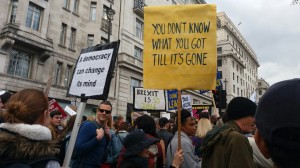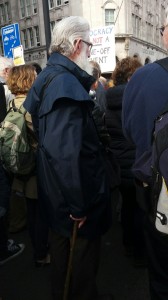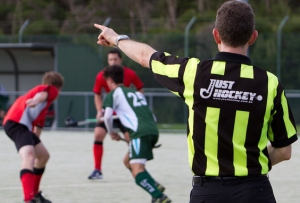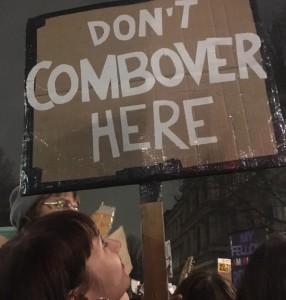Far from the front and away from the TV cameras, yesterday’s huge Remain march unwittingly recreated the Brexit crisis – and the way out of it. Thousands of marchers who joined from the southern end of Hyde Park instinctively headed north into the park in order to curve round to the right and join the huge southbound main flow down Park Lane.
But it was the road to nowhere. Two hours later, at 2 o’clock, we’d gained only a few yards. People were getting impatient, despite knowing the gridlock was a sign of huge success. They’d come to march not stand. Would they miss their coaches back to the four corners of the UK? When someone tried to start the shout, “What do we want?”, the answer was not “People’s Vote”, but “To move!” – to great hilarity.
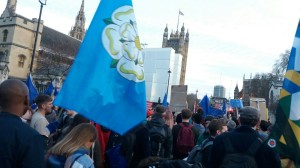
This Yorkshire flag was part of the singing, dancing tail end of the march which finally reached Parliament Square at 1800 – six hours after the march began
Dozens began climbing the barriers into the grassy zone separating us from the main flow, so they could rejoin the main Park Lane flow near the beginning. You could say that party discipline began to break down. Others of us kept nudging north: we’d chosen this path, we could see the goal just 100 yards or so away. We were not for turning. We’d invested too much in this route to change it now.
Suddenly we sensed large-scale movement. The entire crowd behind us, backed up across the southern end of Hyde Park, had changed its strategy. Instead of going north in order to go south, it was suddenly flowing directly south en masse, back down towards Hyde Park Corner and into the main flow of the march.
We shrugged, laughed, and turned to join them – abandoning the tiny amount of ground we’d gained in two long hours. It still took another hour – until 3pm, three hours after we’d begun – to finally get out of Hyde Park and into Piccadilly.
But wheelchairs and pushchairs, dogs bearing placards and guide dogs, the young and old, shuffling or dancing to huge sound systems, chanting or silent, we were on the move at last. The back of the march didn’t reach parliament square until nearly 6pm. For me, one million is a very conservative estimate.
Britain has spent nearly three years trying to head north and curve right, believing the goal is in sight just a few hundred yards away. It’s been slow and painful – no one can dispute that. People have grown weary and frustrated. As in the crowd yesterday, where people could already see they were not on target to miss the coach back, the people of Britain can see things are not going as they thought. They can see that there will be a personal, negative impact on them.
Overwhelming case for change
The case to give up going north and right, and instead to flood back south, into the mainstream, is now overwhelming. Knowing when to do a U-turn is a key skill in many areas of life – including hillwalking, which Theresa May is so fond of.
The economic case is clear – jobs and investment are disappearing, huge corporations and small firms are shipping out, taking their tax dollars and work with them.
The moral case is no less clear. The UK has not just damaged itself, but has been frankly immoral in its treatment of the estimated three million EU27 citizens who came here in good faith to contribute to all levels of our society, to pay tax, to raise families. They are us. UK citizens are also victims: many were left with no vote on a subject that would strip them of the right to continue living where they do, or left with huge uncertainy hanging over them.
The political case is overwhelming. The vote was advisory and flawed. There are multiple indicators that people have changed their minds. Theresa May seems incapable of taking on board a single new piece of information: her thinking is frozen in time, her red lines have become tablets of stone and blocks of concrete around all our necks. She will take the ship down rather than acknowledge that many Leave voters were directly lied to, poisoned by years of toxic lies about Brussels, that many have since died, or changed their minds, or acknowledge that the current situation is a shambles. She ignores the 16 million who voted Remain, the young voters now on stream, the complacent who failed to vote because – like all of us – they thought Remain would walk it.
And that’s not to mention the global influence we’ve squandered. The world is undoubtedly laughing at us, not with us. Their “ariel” view, like that of yesterday’s helicopters, clearly shows an entire country heading north and right when it needs to make a U-turn if wants to make any progress at all. Health, peace, security, prosperity, credibility – the list of reasons to stay goes on and on.
So the march was not just a day of hope and joy, a day of literally dancing through the streets with diverse people of one mind. It was a parable of Brexit. If you’re up a cul-de-sac, do you demolish the entire housing estate that’s blocking the way? Or do you do a nifty three-point turn and carry on with your journey?
Not that simple
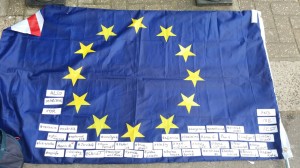
Many people who couldn’t get to the march in person were represented on other people’s flags and placards
Of course what’s happening has far wider dimensions. International skullduggery, geo-political interests, dark money, criminal conduct, deliberate interference, data-scraping. There’s a murky side to Brexit that a million committed souls cannot fix. I didn’t think I would live to see England fall into the hands of the far-right and far-left, and bring the UK down from within. Or to see so much of the media complicit and cowed in the face of it.
But we can still collectively decide as a nation that we will abandoned our failed, gridlocked journey north. We will abandon the route that’s cost us so much time and energy for so little. We’ll turn back, flow south into the main river and take our place again in the world.
This may sound naive given just how boxed in we are. But I believe a lot of middle-ground people now accept the Leave vote was flawed. On top of which, they’re not getting the Brexit they were promised – nothing like it, in fact. The hardcore agitators will be unhappy whatever we do. The status quo of austerity and hopelessness was terrible for many people, which we must acknowledge. Our first-past-the-post system has been found wanting.
But all this reminds me of the old joke about how to eat an elephant (answer: one piece at time). Let’s focus on stopping Brexit as a beginning of the change we need to see, not an end in itself. The EU has thrown us a lifeline: a potential two-year delay to turn ourselves around. We have a chance to revote or revoke. Let’s take it.

